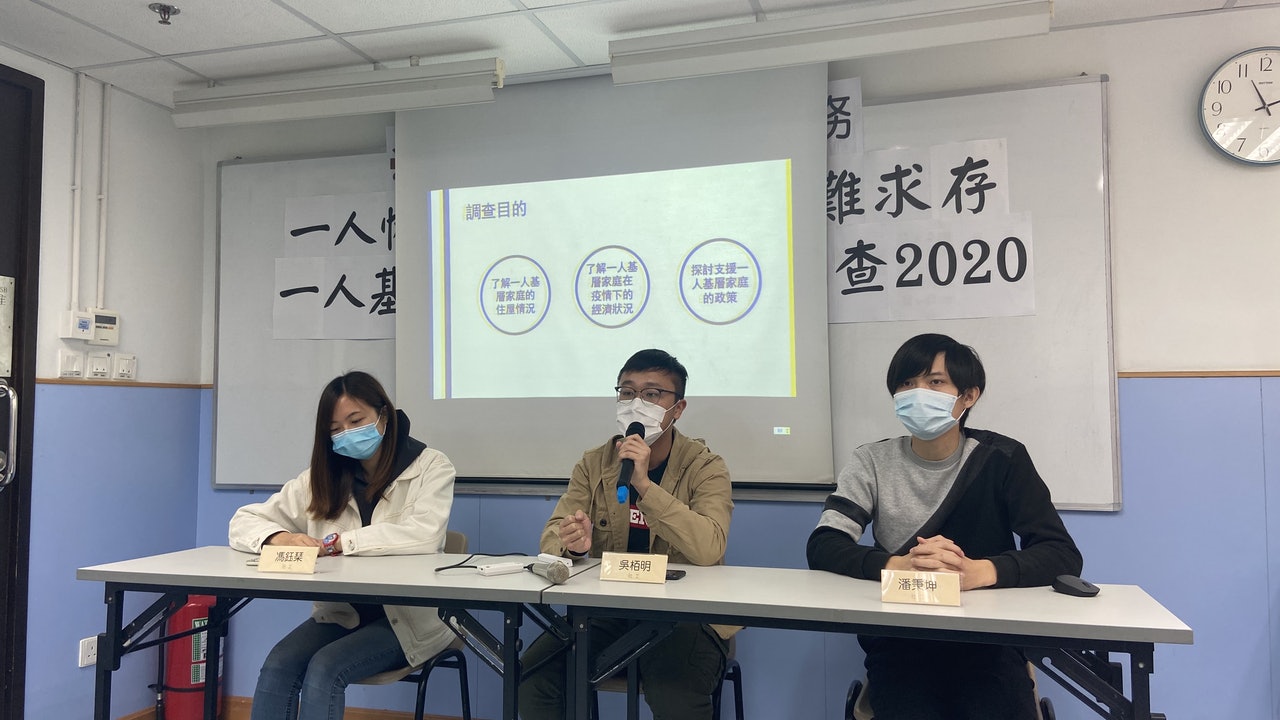Social News
Written by: Yuan Shu
2021-01-25 11:25
The last update date: 2021-01-25 11:25
From July to November 2020, the Caritas Community Development Service interviewed 246 grassroots singles renting in squatters, village houses and private buildings within the service area to learn about the housing situation of one-person grassroots families and the epidemic situation. Economic situation, and explore ways to improve.
The survey found that 80% of the interviewees are currently unemployed, and more than 60% live in sub-divided houses.
Some yoga instructors were out of work during the epidemic and could only apply for CSSA to solve living expenses. They even ate only one meal a day.
The survey found that 80% of grassroots singles are currently unemployed, and more than 60% live in sub-divided houses.
(Photo by Yuan Shu)
The survey interviewed 246 singles at the grassroots level and found that one-person grassroots families need to face working poverty for a long time and live in various types of unsuitable housing.
Feng Yuqin, a spokesperson for the Caritas Community Development Service, said that 80% of the respondents are under 60 years old, and more than 80% are currently unemployed. At the same time, the median income of the respondents under the epidemic is only 10,000 yuan. It is lower than the monthly income ceiling of the "Working Family Allowance" (ie 14,100 yuan), reflecting that the respondents are in working poverty.
Many people in Hong Kong live in sub-divided houses.
(Profile picture)
In addition, the survey showed that the interviewees all lived in various types of unsuitable residences, 63.4% lived in subdivided houses, 15.4% lived in squatter houses, and 8.9% needed to share kitchen and toilets.
20% of the interviewees are unable to pay the rent due to unemployment or reduced income, and more than 60% have less than 3 months of savings to meet the rent. This reflects that the economic crisis of a grassroots family is full of crisis and the basic living needs of housing are not affected. Guaranteed.
One of the interviewees, Ashi, lived in a hotel unit in Mong Kok before the epidemic, as a yoga instructor, and lived a stable life.
At the beginning of the epidemic, the work was reduced, so she enrolled in the caregiver course. After the epidemic broke out, not only did yoga work stop, but the course could not be taken smoothly. She could only apply for CSSA to live on, cut down on food and clothing, and sometimes only eat one meal a day. Helpless.
Advocate the implementation of the "Cash Allowance Pilot Scheme", but it needs to include the elderly one-person households
spokesperson Pan Bingkun called on the government to propose the "Cash Allowance Pilot Scheme" in the 2020 policy address to include non-elderly one-person household qualifications, so as to relieve the economics faced by the one-person households pressure.
In addition, Poon said that the government will implement rent control as soon as possible, and re-examine the scoring system for non-elderly applicants for public housing, so as to rekindle the hope of one-person grassroots families in the future.
Caritas Community Development Service spokesperson Feng Yuqin said that he hopes the government will implement rent control as soon as possible.
(Photo by Yuan Shu)
Jordan Closed Area | Residents in restricted areas who buy meals and buy meals in restricted areas: drink soup and buns as water and eat bread
New crown pneumonia | Urban Renewal Authority assists the free disinfection plan for sub-households of Sanwu Building in Changshawan until March
Epidemic exposes social injustice and the problem of sub-houses cannot be ignored
The Center for Health Protection claims that ethnic minorities are vulnerable to disease and will denounce discrimination: hidden concerns about transmission of residential housing
01News
New Coronary Pneumonia Subdivided Housing







/cloudfront-eu-central-1.images.arcpublishing.com/prisa/JHLX47SHC5CTZBAKK7AZFYX7WY.jpg)


/cloudfront-eu-central-1.images.arcpublishing.com/prisa/KMEYMJKESBAZBE4MRBAM4TGHIQ.jpg)


